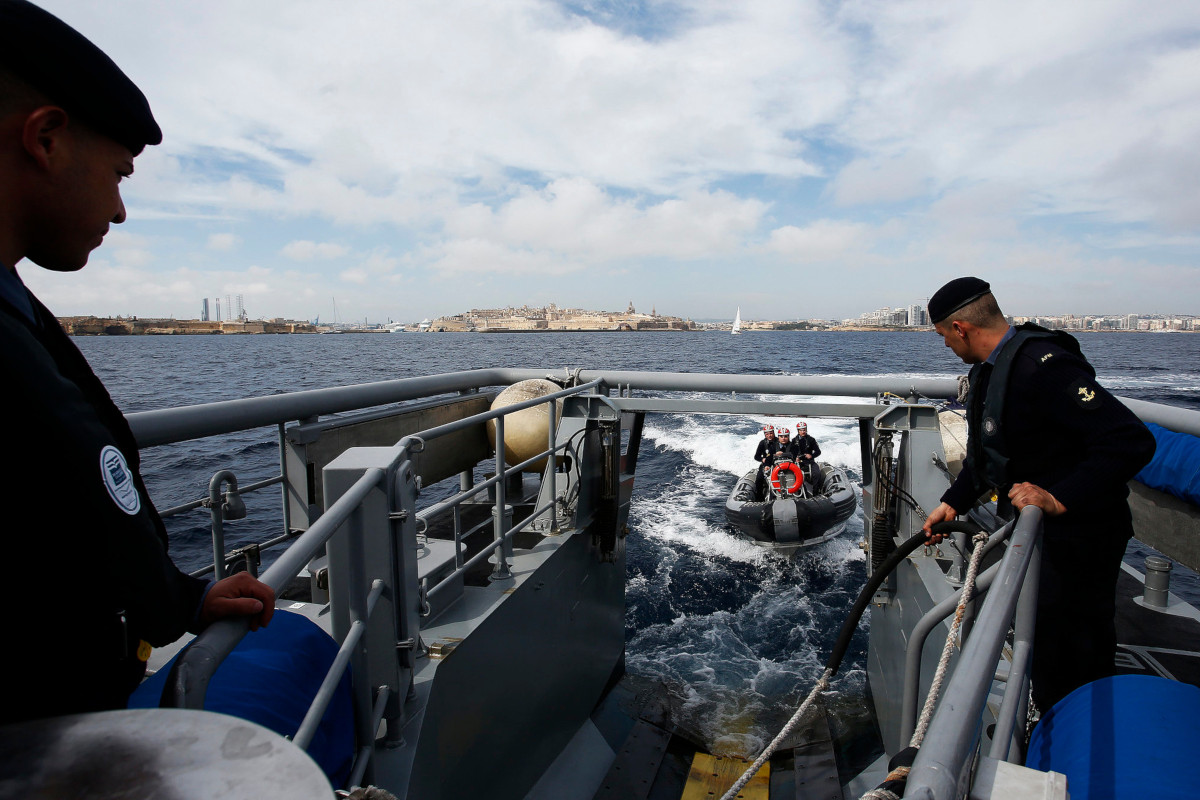Greece: The new hotspots and the prevention of “primary flows”: a human rights disaster
Topic
Country/Region
13 December 2021
The Greek government and the EU have evicted various self-managed hospitality structures and are now closing down the squalid, state-run refugee camps on the islands of the Aegean. People are being transferred to newly-built "closed controlled access centres". These prison-like facilities, which are coming into use at the same time as a the services available to refugees are being cut back, are having injurious effects upon people's mental health and wellbeing. Nevertheless, with the Greek government focusing on preventing "primary flows", it seems the new camps are set to play a growing role in the detention of people awaiting deportation.
Support our work: become a Friend of Statewatch from as little as £1/€1 per month.
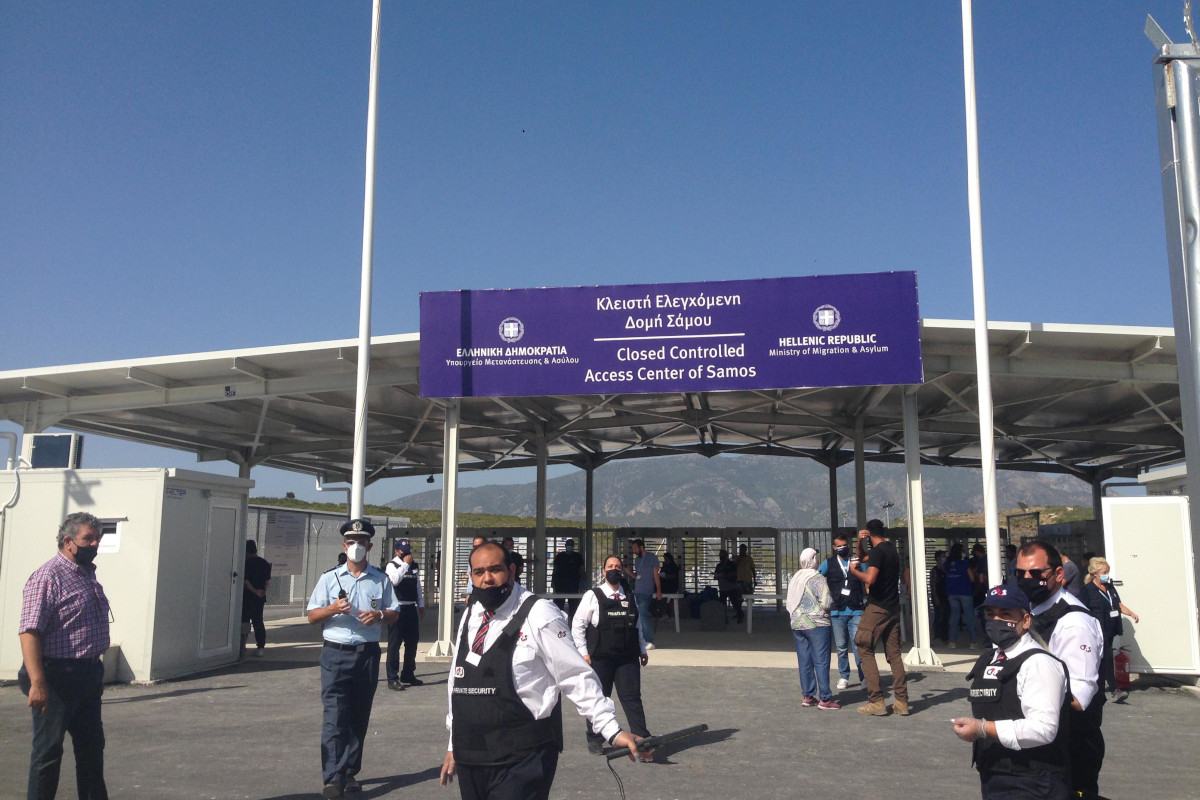
By Wasil Schauseil, independent journalist and member of Migration-Control.info. All images by Wasil Schauseil, CC BY NC 2.0 licence.
Only 1.5 kilometres of sea separate the Greek island of Samos from the Turkish mainland. Samos is one of the “hotspots” defined by the EU - a main arrival point for asylum seekers trying to enter the EU via Turkey. On 18 September, the first of four “Multi-Purpose Reception and Identification Centres”, as they are called in EU documents, was opened here in an elaborately staged ceremony. The Greek government’s preferred name more closely reflects that originally proposed by the EU: “Closed Controlled Access Centre”.
“Closed controlled” also better reflects the impression you have as an observer: 150,000 square metres of white containers, concrete, loudspeakers, surveillance cameras, revolving doors and metal detectors, surrounded by two rows of NATO barbed wire. Located in remote Zervou, eight kilometres from the island's capital Vathy, the new camp is meant to provide security for residents, staff as well as the local population, and to “reduce the impact of immigration in local communities”, as Greek Migration Minister Notis Mitarakis puts it. In addition to the area for asylum seekers, there is also an area for detention pending deportation, as in all the “closed controlled” camps under construction or being planned.
€48 million have been invested by the EU in the Zervou camp. €228 million will fund the other four camps on the islands of Chios, Lesvos, Leros and Kos. The Zervou camp is designed for 3,000 people; at present, around 300 people are accommodated there.
The psychological burden of chronic insecurity and endless waiting
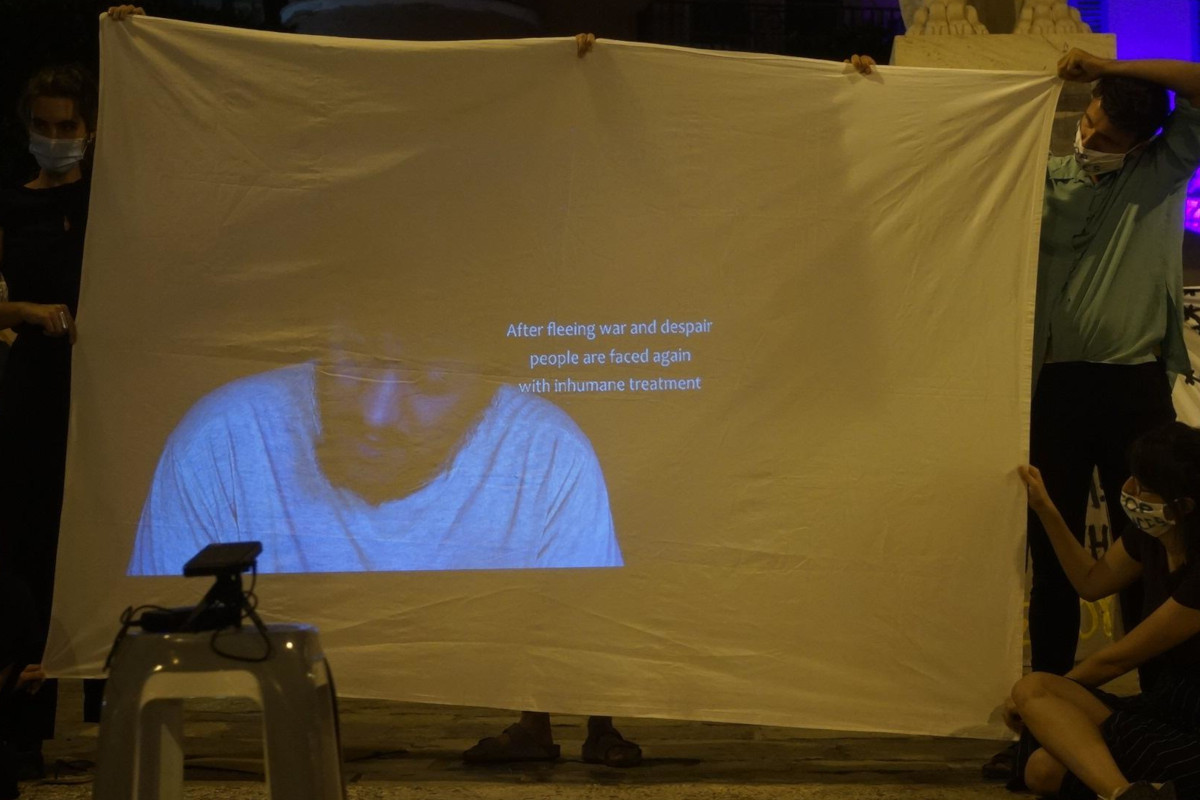
A film screening at a protest before the move to the new Zervou "closed controlled access centre".
In the old camp on the outskirts of Samos' capital Vathy, the mood is tense in the days before the move to Zervou. At a protest rally in the town centre, Syrian filmmaker Ahmed Ibrahim, who himself lived in the camp, shows a film that accurately captures the anxiety that's looming in the air:
“We are in a prison and the new camp is a prison. [...] I came here [in August 2019] to be treated. I came from Syria. I am a victim of the war. My father died from sarin gas, I was injured. I have been here for two years, they have done nothing for me. I am mentally unstable. I mean, I have started to lose my memory. Now they want to take me to a new camp. The things we didn't see in Syria, we saw here.”
This is how Ramadan, one of the protagonists, describes a widespread feeling among asylum seekers currently stuck on Samos. After months or years on the island, the desire to finally leave and take things into their own hands is predominant.
In fact, many hundreds of people have been able to leave Samos for the mainland since the beginning of the year. According to UNHCR, most of them were recognised refugees or asylum seekers recognised as “vulnerable” who were able to switch from the fast track border procedure of the hotspots to the regular procedure on the mainland. At the same time, local NGOs report that at times people with rejected applications were also able to leave the islands, either with a short-term travel permit and a request to leave the country or with the silent acquiescence of the police.
This “decongestion of the islands” was a central election promise of the New Democracy government, which came to power in summer 2019. There is no long-term plan for what is to happen to the people on the mainland. Those who cannot afford to leave Greece or hope for a positive asylum decision are mostly accommodated in camps on the mainland. Others try to travel to Central and Northern Europe with forged papers or via the ‘Balkan Route’ – a major preoccupation for EU policymakers.
For those who could not leave Samos, the fear of isolation in the new remote camp was greatly increased by a lack of information in the previous months. The move had been postponed several times since June and until recently there was no clarity about how daily life would be regulated in the new camp. Daniela Steuermann, medical coordinator of Médecins Sans Frontières on Samos, reports that the psychological condition of her patients had deteriorated considerably in the weeks before the camp opened:
“Self-injurious behavior has been a big problem. A few weeks ago, a lot of people from Syria were hurting themselves with knives and scalpels right in front of the clinic in the reception center, because there was just so much frustration. People just didn't want to go there, because it feels like the end of the line.”
Better living conditions or risk of re-traumatisation?
After the Moria fire in September 2020, the European Commission created a ‘Task Force Migration Management’ to ensure future compliance with EU standards in refugee camps. Investigative research shows that the Task Force, the Greek authorities and other EU agencies and international organizations met monthly to design the five camps. Among them was the EU’s Fundamental Rights Agency (FRA), which urged, among other things, the abandonment of “prison-like fencing” and uniformed personnel “to prevent the risk of re-traumatisation of people who have suffered violence and persecution”.
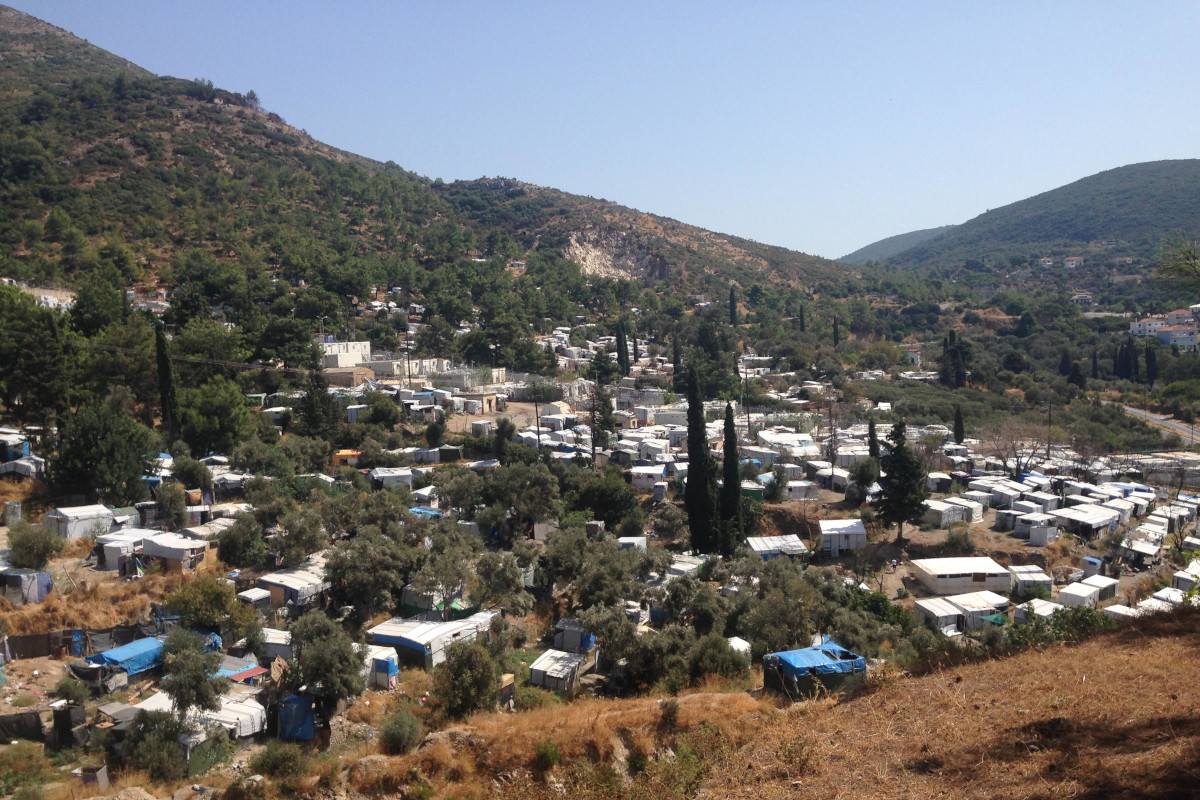 The old Vathy camp on Samos, now abandoned in favour of the "closed controlled access centre".
The old Vathy camp on Samos, now abandoned in favour of the "closed controlled access centre".
Instead of heeding these warnings, the Greek government is relying on a new surveillance system to consolidate its control over the camps. While people were searched with metal detectors at the entrance gate on the day of the move, Migration Minister Mitarakis opened a new control room in Athens, attended by 26 EU member state ambassadors.
Called CENTAUR, this is the heart of the new “security management system” of all 36 camps in Greece. With the help of cameras, drones and AI-assisted movement analysis, suspicious crowds and incidents will be detected in real time. Together with two other systems (Hyperion and RAE) for monitoring refugees, CENTAUR is fully funded by the EU, including €37 million through the Recovery and Resilience Facility, which is intended to support economic recovery after COVID-19.
The Greek Migration Ministry and representatives of the European Commission emphasize the safety and good conditions in the new camp. EU Commission Vice-President Schinas, responsible for “promoting the European way of life”, tweets that the new Zervou camp “receive(s) asylum seekers and migrants with dignity and respect for the values on which our Union is based.” Head of government Mitsotakis calls the camp “impeccable”.
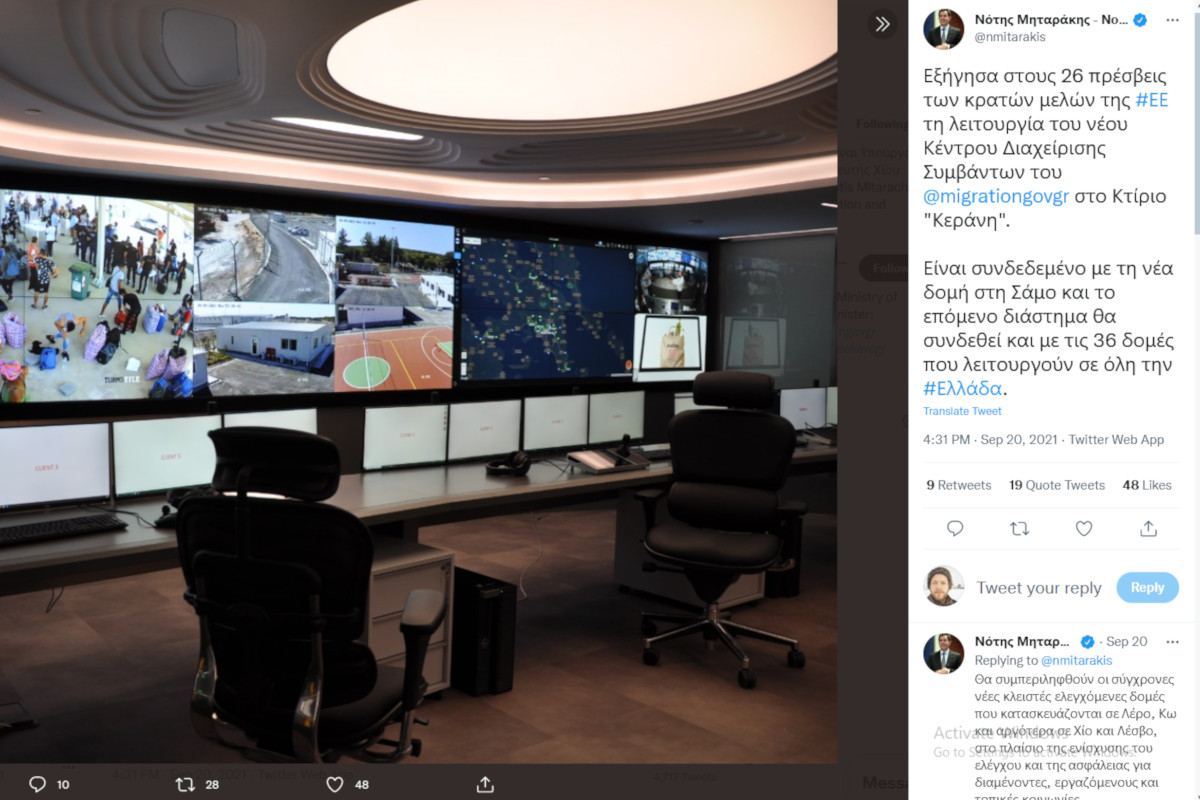
Greek minister for migration and asylum, Notis Mitarakis, extolling the virtues of the new camp surveillance system via his Twitter account.
Not everyone shares this rosy view of the new sites. Simone Innico, from the NGO Samos Volunteers, is in regular contact with the camp’s residents. He notes:
“With the transfer to this new facility, despite the relative improvement of material conditions, we can register a cumulative negative impact on people’s livelihood, mental health, access to protection mechanisms and legal support.”
A letter of complaint from Europe Must Act to the local camp administration already pointed out considerable deficiencies in the camp at the beginning of October and complaints from the residents, who reported, among other things, the poor quality of the food rations. An open letter from Syrian refugees ten days after the move to Zervou states:
“Staying here and being condemned to do nothing, we suffer and we are a burden to our families. Our minds are devoured by mental illnesses, we lose ourselves. We are neither bad nor violent people, but this place slowly drives us crazy.”
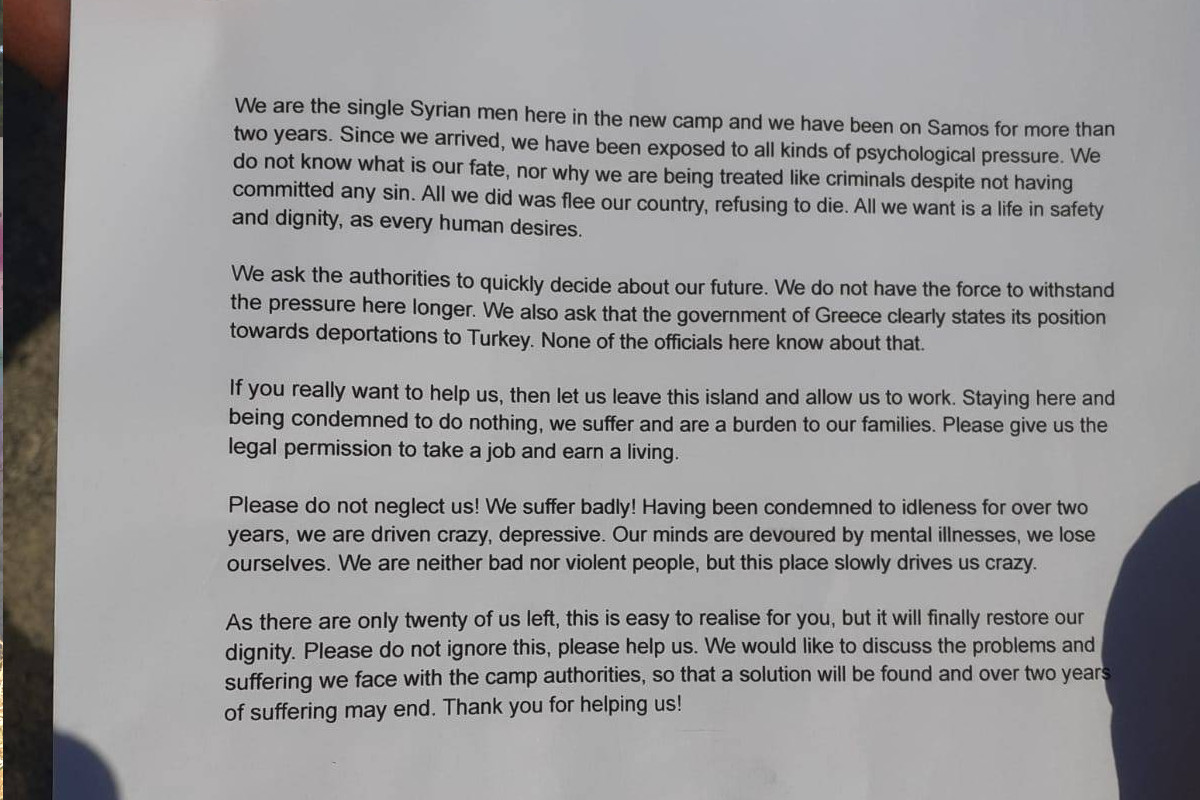
A letter of protest from 20 Syrian men who have been kept on Samos for more than two years.
According to a staff member of Avocats sans Frontières on Samos, the combination of the accelerated asylum procedure at the hotspots and the COVID-19 quarantine regulations results in particular hardship for asylum seekers. New arrivals are quarantined for 14 days and their access to legal assistance during this time depends on having a telephone and contacts with legal advisors. At the same time, the accelerated border procedure means that once the quarantine is over, the summons for the first asylum interview can be issued with less than 24 hours' notice, severely limiting the possibility of legal preparation for this crucial interview. Further, a member of the Human Rights Legal Project reports:
“We have been prevented in several cases from obtaining power of attorney from new arrivals because they were isolated. If security measures have to be respected because of Covid, this should not prevent newcomers from exercising their rights.”
According to Erasmia Roumana, part of UNHCR's protection programme for the Greek islands, the conditions in Zervou are clearly better compared to the old camp, but for the people it is about something else: “It’s a matter of not feeling secure about what is going to happen in the future. It’s an uncertainty with their procedures that creates a general agony.”
Deteriorating services and fortification of the camps on the mainland
Mounting uncertainty was also caused in Zervou and throughout the country because asylum seekers had not received any financial support for several weeks. This was due to problems with the transfer from the UNHCR to the Greek government of the ESTIA program , through which asylum seekers receive a monthly sum of money (€75 for a single person) and, under special circumstances, the possibility of housing outside the camps. Liza Papadimitriou, MSF Humanitarian Affairs Officer is critical of the handover:
“We are already seeing problems in terms of discontinuance of services to people, the reduction of standards in shelters for vulnerable people, they are putting in more people in less space and they are closing it completely for the islands. This was the last resort that we had in terms for getting people with a treatment plan out of the camp and put them in a safe place, we won't have any resort left outside the camp.”
While the handover of the ESTIA housing program was completed in the summer, UNHCR also stopped its financial services on 15 September, which were to be continued by the government. By the end of November, however, around 34,000 people still had not received any money from the Greek authorities, despite the Migration Ministry’s assurance that the program would be resumed by the end of October.
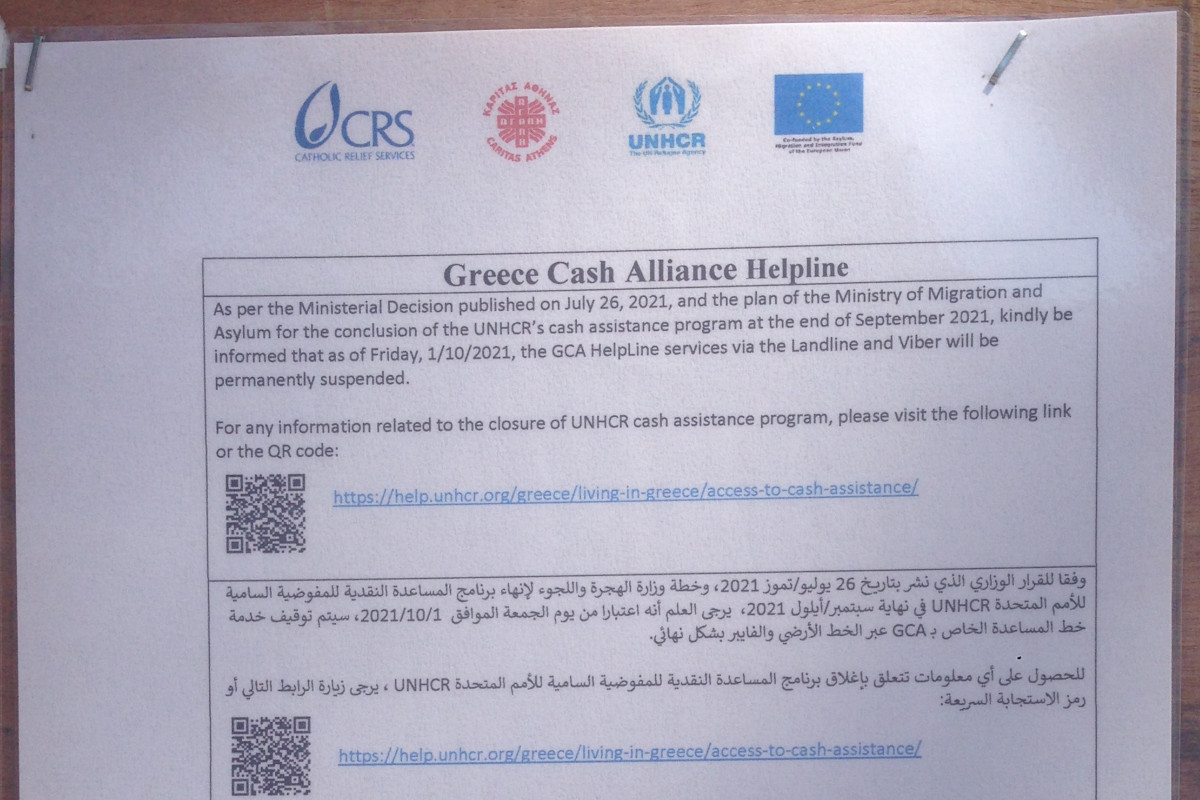
In the meantime, following the implementation of a new law in October which stopped the provision of services to those whose asylum applications have been successful, food rations were only given out for people still in the asylum process. An open letter from 26 civil society organizations states:
“It is estimated that 60 per cent of people living in camps on the mainland do not receive food. Food insecurity, let alone complete food deprivation, should not be experienced by anyone, especially not at the hand of the state.”
The handover of the UNHCR programs to the government brought another change: the entitlement to financial support was linked to the stay in one of the 36 nationwide camps. This is part of a “strategy by the Greek authorities to have only one place to house asylum seekers”, explains Stella Nanou at UNHCR's Athens headquarters. Part of this was also the government's decision to end the ESTIA housing program for people with special protection needs on all islands. At the same time, the closure of Kara Tepe and the eviction of the self-organised PIKPA spelt the end of the last two shelters outside the large camp of Mavrovouni (‘Moria 2.0’) on Lesvos.
Often located away from urban centres and with poor connections to public transport (for example in Ritsona or Nea Kavala), the camps on the mainland have also been increasingly fortified with fences and walls in recent months. In many places this work has been organized by the International Organization for Migration (IOM). On both the islands and the mainland, therefore, the government is seeking to reduce contacts between migrants and Greek society more broadly. Besides the humanitarian problems and tensions that arise in large and remote camps, this severely limits opportunities for education and building a life in Greece.
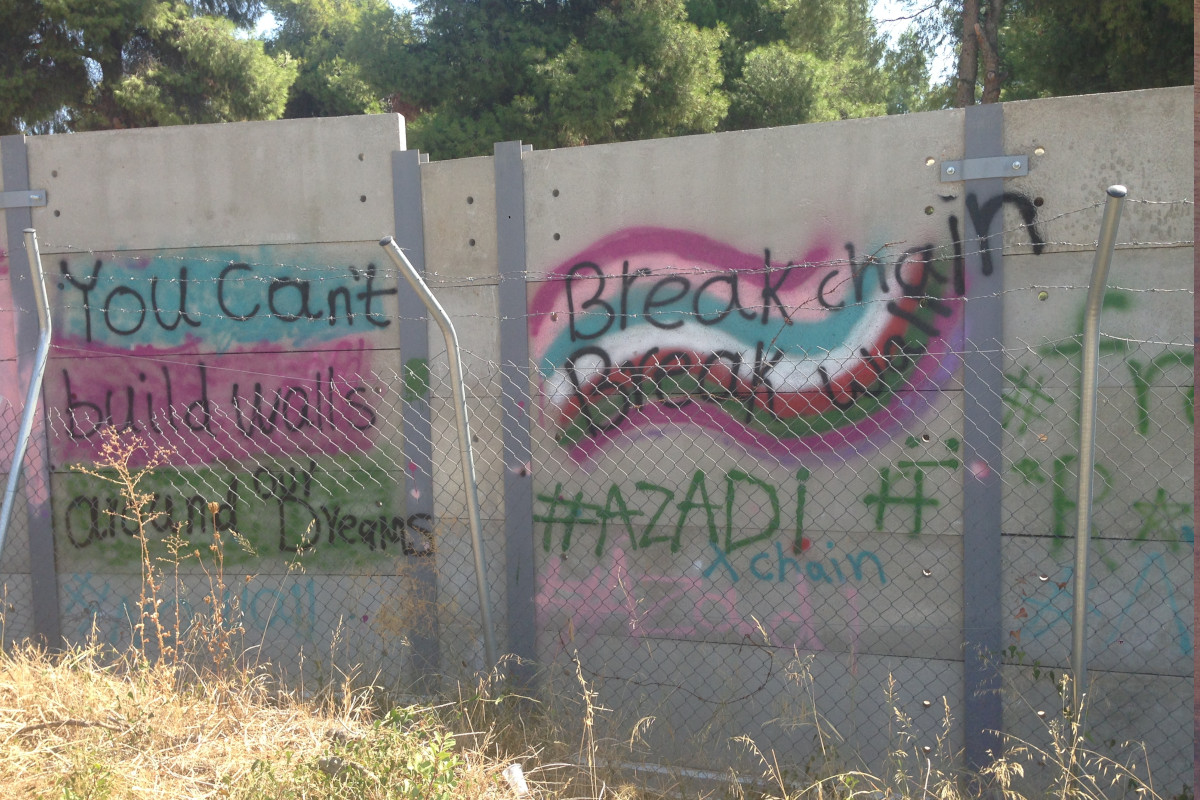
Graffiti on the walls of the Ritsona camp.
Preventing “secondary movements” from Greece
The Greek government has no interest in asylum seekers or recognized refugees staying in Greece in the long-term, and thus no interest in a significant improvement of living conditions, work or education opportunities. On the contrary, the increasingly restrictive policies regarding asylum law, vulnerability criteria, financial support and accommodation – let alone an increasingly aggressive rhetoric against migrants – indicate that refugees are being pressured to leave the country quickly. Liza Papadimitriou from MSF puts it clearly:
“Let's not hide behind a rhetoric of improving living conditions. That hardly happens in Greece. Setting up containers, subjecting people to all this violence, evicting recognized refugees, not having absolutely any system in place for integration, depriving asylum seekers from care... It has actually become worse.”
Indeed, a majority of people who receive asylum in Greece try to leave the country as soon as possible to reapply for asylum in a northern EU member state. The response from those states came in June this year when six interior ministers, including Germany’s Horst Seehofer and France’s Gérald Darmanin, called on the European Commission and the Greek government to take action to end “secondary movements” from Greece. They said it must be ensured that “substandard” conditions in the country are addressed. The aim is to be able to return asylum seekers and recognized refugees back to Greece, which is currently prevented by some courts which hold that Greece is not ensuring a minimal level of physical subsistence. In the Migration Ministry's response, Mitarakis makes it clear that the Greek government’s primary goal lies elsewhere:
“Our principled position […] is that the focus needs to be placed on preventing primary flows. Should smugglers beat us at the external borders, inevitably they beat us at our internal borders too. We need to work more closely with FRONTEX and support the agency in its critical role to protect our external borders.”
There is broad backing for this line, including from French Interior Minister Gérald Darmanin, who, after visiting the new camp on Samos, holds up Greece's border policy as a model and praises the government's “absolutely effective“ fight against illegal migration.
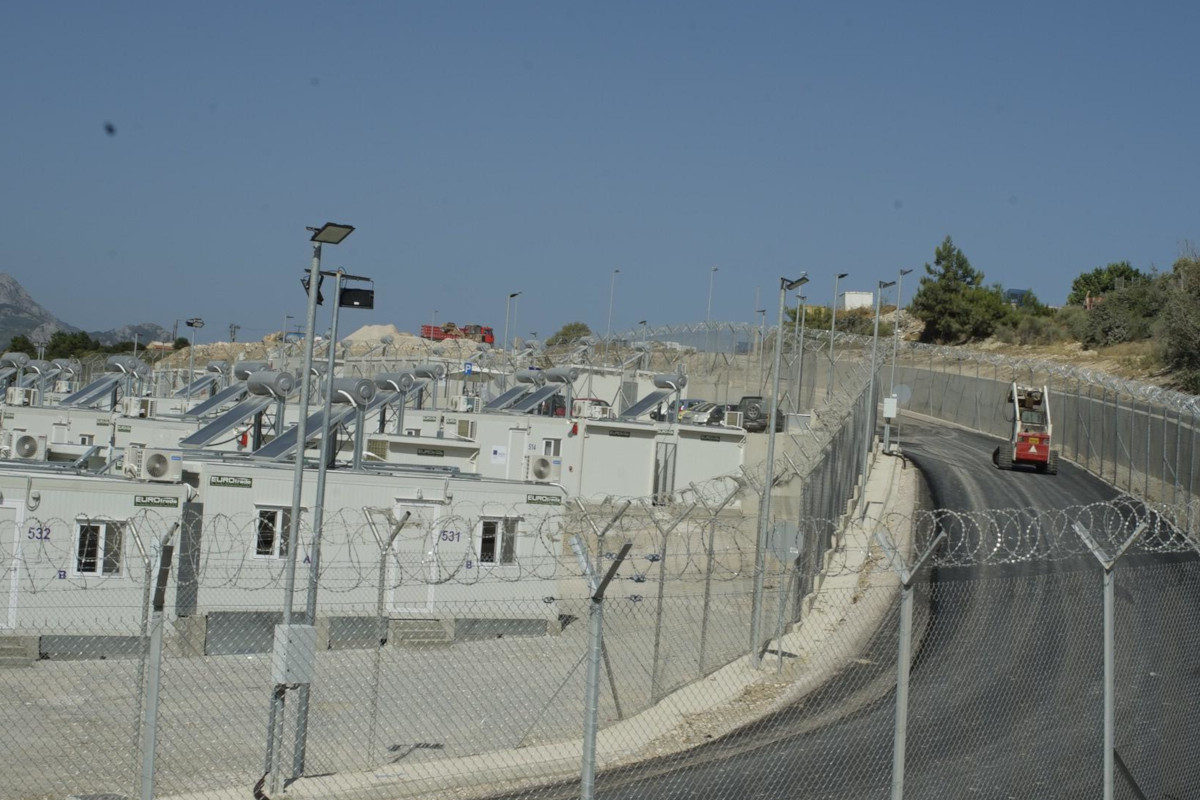
The new "closed controlled access centre" at Zervou.
Preventing “primary flows”: collective expulsions and safe third countries
A major result of this “fight against illegal migration” is the significant increase in collective expulsions (“pushbacks”) across land and sea borders. In addition to breaching the non-refoulement principle, such pushbacks involve systematic abductions, ill-treatment and humiliation by security forces, including torture techniques such as mock executions and the use of electrical discharge weapons.
Due to the high number of illegal returns, UNHCR figures on registered arrivals are not accurate and should be compared with statistics on prevented arrivals, such as those published by Aegean Boat Report (ABR) or Mare Liberum. For comparison, while UNHCR only counts the 3,324 asylum seekers who arrived and were registered since the beginning of this year, ABR registered at least 20,938 prevented arrivals – most of whom likely became victims of forced expulsions. Perhaps because of their role in highlighting the criminality of the Greek authorities, monitoring organizations in the Aegean such as Mare Liberum are being criminalized by the state.
However, pushbacks are just one part of the government's strategy to prevent “primary movements” to Europe. In June, the Greek government issued a decree declaring Turkey a safe third country for asylum seekers from Afghanistan, Syria, Somalia, Pakistan and Bangladesh – the countries of origin of the vast majority of people arriving to Greece. Since then, they can only apply for asylum if they can prove in an admissibility check that Turkey is not safe for them. Under the new law, those who cannot do so are excluded from the asylum procedure and must be deported to Turkey. However, Turkey has not agreed to take people back, a point that was also highlighted in a recent Frontex report on deportations.
Amelia Cooper of Legal Centre Lesvos observes an increase in “copy-paste” rejections based on the Turkey decision, leaving those affected in a legal limbo where they face up to 18 months of deportation detention in Greece. Stella Nanou from UNHCR also fears an increase of prolonged detention and notes that the new procedure ignores the actual reasons people flee:
“We are talking about countries where there are human rights violations, where there is persecution. The admissibility checks do not go into the essence: ‘Why did you flee your country? How is the situation back in your country?’ No, all the questions are just about traveling or staying in Turkey.”
Numerous organizations, including Legal Centre Lesvos and HumanRights360 share this criticism and also doubt that Turkey can be considered safe. The experience of Daniela Steuermann from MSF confirms this:
“We always hear that women and men are abused, beaten and mistreated in Turkey. Then they come this difficult way across the sea, many report that they have been pushed back once or twice and have experienced a lot of violence at sea by the pushbacks.”
“I need to remind you that the people in Turkey are not in danger,” Greek head of government Mitsotakis, on the other hand, stressed at a press conference with his Dutch counterpart Mark Rutte in early November. Challenged about the overwhelming evidence of pushbacks by Greek security forces, Mitsotakis insisted that there is “no material evidence”, but in the same breath invokes the right to “intercept boats from Turkey and wait for the Turkish coast guard to pick up and return people”.
It is indicative of the post-factual rhetoric of the Greek government of New Democracy that it seeks to deny the practice of forced collective expulsions as conspiratorial “fake news” despite an overwhelming body of evidence, while at the same time indirectly admitting to it under the right to protect Greece’s borders. In the same rhetoric, incidents like the recently foiled pushback of 382 people can be reinterpreted as a rescue operation by the Greek coast guard.
Thus, a further intensification of the already restrictive and brutal policy of deterrence can be observed. The true scale and systematic nature of collective expulsions is likely to be as unprecedented as the Greek government's public lies about the practice. At the same time, the Turkey decision further undermines the right to asylum in Europe, although the full extent of the impact is yet to be seen. Certainly, the new “closed-controlled” camps will play a significant role in the deportation detention of growing numbers of people unable to climb the increasing hurdles of the European-Greek border regime.
Wasil Schauseil
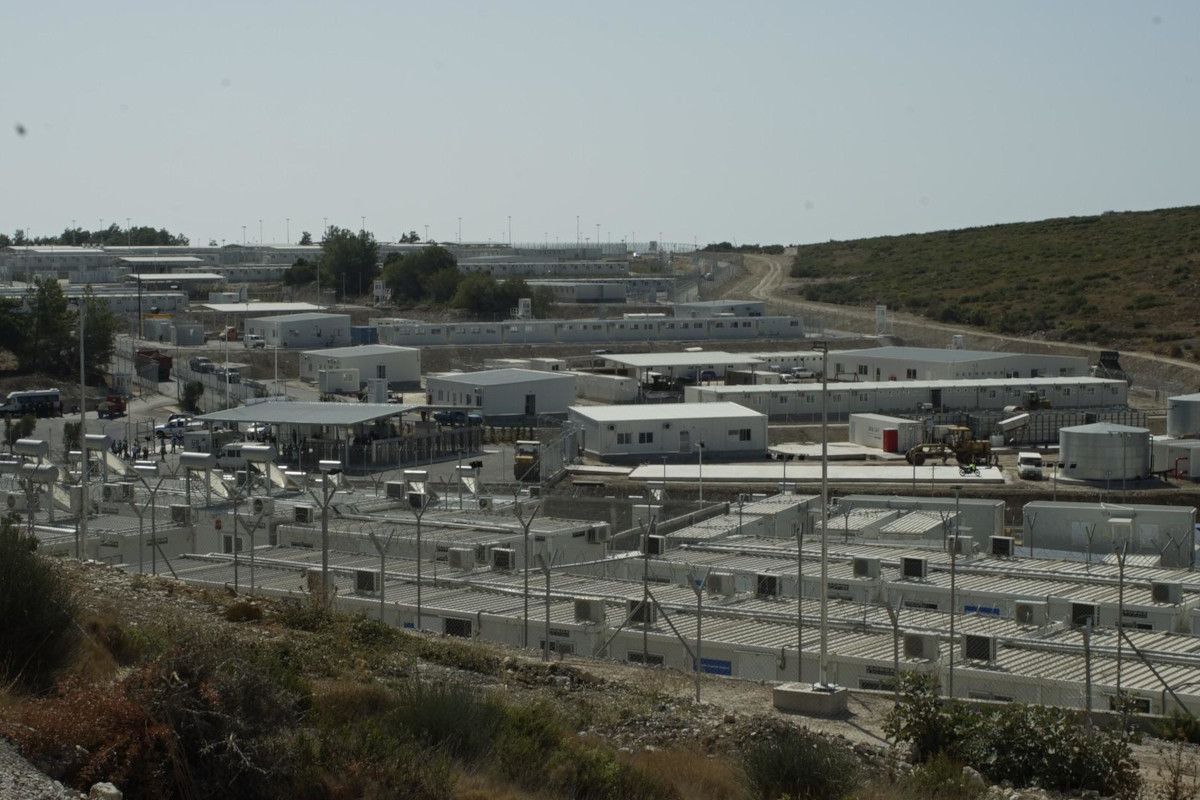
The new camp at Zervou: “With the transfer to this new facility, despite the relative improvement of material conditions, we can register a cumulative negative impact on people’s livelihood, mental health, access to protection mechanisms and legal support.”
Our work is only possible with your support.
Become a Friend of Statewatch from as little as £1/€1 per month.
Previous article
Next article
UK: Statewatch submission to consultation on reform of the Data Protection Act 2018
Spotted an error? If you've spotted a problem with this page, just click once to let us know.
